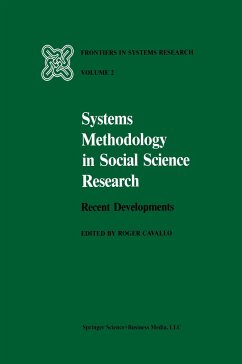
Systems thinking
Concepts and notions

PAYBACK Punkte
20 °P sammeln!
There is no generally accepted, clearly delineated body of know ledge concerning systems thinking. The multiplicity of thinking is well illustrated by the various names such as: (general) systems theory, systems thinking, systems approach, systems analysis, sys tems synthesis, systems engineering, etc. These terms refer to various fields of knowledge that either overlap or are completely different. For this reason we consider it useful to try to develop a common language, a common set of concepts. In this book we have tried to launch such a common language. We shall try to develop a set of coh...
There is no generally accepted, clearly delineated body of know ledge concerning systems thinking. The multiplicity of thinking is well illustrated by the various names such as: (general) systems theory, systems thinking, systems approach, systems analysis, sys tems synthesis, systems engineering, etc. These terms refer to various fields of knowledge that either overlap or are completely different. For this reason we consider it useful to try to develop a common language, a common set of concepts. In this book we have tried to launch such a common language. We shall try to develop a set of coherent concepts and notions. We have consciously tried to make the minimum use of mathematical or logical symbols in our descriptions and definitions. This promotes more positive access to the concepts. We think that the language of the formal sciences, mathematics, can only be pardy of use to us in considering the application of systems thinking in complex em pirical situations. Our set of concepts is based on various descrip tions known from the literature. In order to explain the concepts and ideas as clearly as possible, we have illustrated them with exam ples from various academic fields such as sociology, psychology, business, management, economics, technology and the natural sciences. In the main, we have chosen relatively simple examples.














